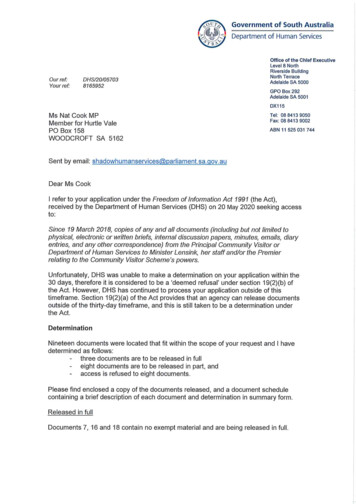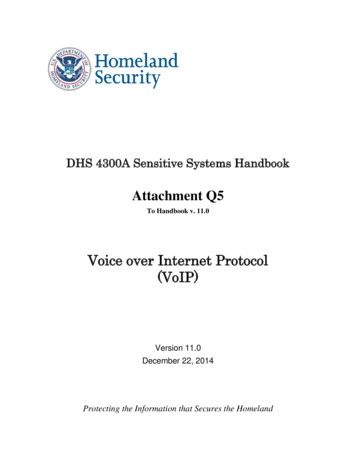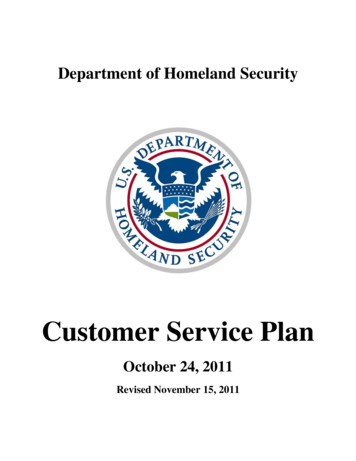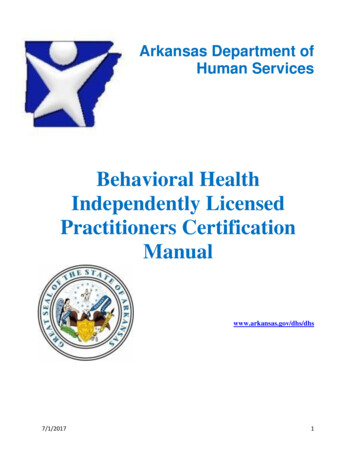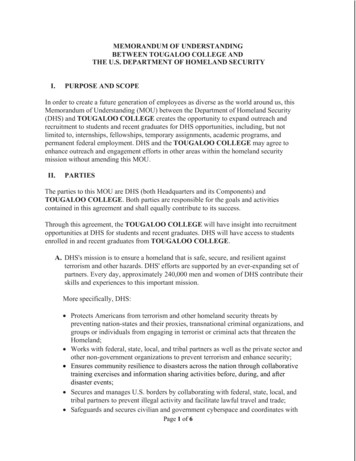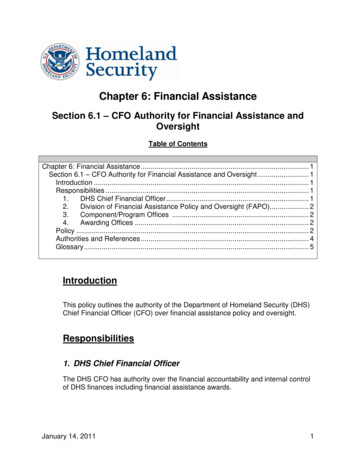
Transcription
Chapter 6: Financial AssistanceSection 6.1 – CFO Authority for Financial Assistance andOversightTable of ContentsChapter 6: Financial Assistance . 1Section 6.1 – CFO Authority for Financial Assistance and Oversight . 1Introduction . 1Responsibilities . 11.DHS Chief Financial Officer . 12.Division of Financial Assistance Policy and Oversight (FAPO). 23.Component/Program Offices . 24.Awarding Offices . 2Policy . 2Authorities and References . 4Glossary . 5IntroductionThis policy outlines the authority of the Department of Homeland Security (DHS)Chief Financial Officer (CFO) over financial assistance policy and oversight.Responsibilities1. DHS Chief Financial OfficerThe DHS CFO has authority over the financial accountability and internal controlof DHS finances including financial assistance awards.January 14, 20111
Section 6.1 – CFO Authority for Financial Assistance and Oversight2. Division of Financial Assistance Policy and Oversight (FAPO)The FAPO division is responsible for coordinating with other DHS Headquartersoffices as necessary to implement this policy.3. Component/Program OfficesThe Component and program offices (hereinafter referred to as Components)coordinate with DHS awarding offices to ensure that recipients comply with termsand conditions of financial assistance awards and approved program activities.4. Awarding OfficesThe awarding offices take appropriate actions to ensure compliance with thispolicy in the announcement, award, implementation, and closeout of assistanceprograms. The awarding offices are responsible for coordination with theirrespective program offices in the enforcement of this policy.PolicyThe Secretary of Homeland Security has tasked the Under Secretary forManagement (USM) with oversight responsibility for financial assistanceprograms (through Delegation 0201.1). Subsequently, the USM issuedDelegation 01000, which delegated authority for development of financialassistance policy, the oversight functions of which have also been delegated tothe DHS CFO.The policy and oversight functions, in tandem with internal control proceduresimplemented by Components and awarding offices, work to providereasonable assurances of DHS’s compliance with statutes and regulationsassociated with the financial assistance management lifecycle process.To ensure compliance, the CFO is committed to working with Component andawarding office staff to develop and issue policies that reflect statutory andregulatory requirements and set reasonable standards for all phases of thefinancial assistance management lifecycle process. In order to strengthen andunify DHS operations and management among the financial assistance awardcommunity, the CFO will institute standard, agreed-upon policies for all phases ofthe financial assistance award process and post them for the reference ofinternal and external stakeholders.CFO will develop oversight procedures to assist Components and awardingoffices in the development of best practices throughout the financial assistanceJanuary 14, 20112
Section 6.1 – CFO Authority for Financial Assistance and Oversightaward process. Oversight in this context is viewed as positive activities that willenhance rather than disrupt or interfere with operational aspects of financialassistance management. In addition, this activity will contribute to continuousgrowth and development operationally and will facilitate staff professionaldevelopment.January 14, 20113
Section 6.1 – CFO Authority for Financial Assistance and OversightAuthorities and ReferencesAuthoritiesDHS Delegation 0201.1, Delegation to the Under Secretary for ManagementDHS Delegation 01000, Delegation to the Chief Financial Officer of FinancialAssistance Policy and OversightPublic Law (Pub. L.) 101-576, Chief Financial Officers (CFO) Act of 1990Pub. L. 107-296, Homeland Security Act of 2002ReferencesOffice of Management and Budget (OMB) Circular A-50, Audit Follow-UpOMB Circular A-102, Grants and Cooperative Agreements with State and LocalGovernments (REVISED 10/7/94, as further amended 8/29/97) Common Rule at44 Code of Federal Regulations (CFR) Part 13, “Uniform AdministrativeRequirements for Grants and Cooperative Agreements to State and LocalGovernments”OMB Circular A-110, Uniform Administrative Requirements for Grants and OtherAgreements with Institutions of Higher Education, Hospitals, and Other NonProfit Organizations (2 CFR Part 215)OMB Circular A-123, Management's Responsibility for Internal ControlOMB Circular A-133, Audits of States, Local Governments, and Non-ProfitOrganizationsJanuary 14, 20114
Section 6.1 – CFO Authority for Financial Assistance and OversightGlossaryThe following tables contain definitions of the acronyms and terms used in thispolicy.AcronymDefinitionCFOChief Financial OfficerCFRCode of Federal RegulationsDHSDepartment of Homeland SecurityFAPOFinancial Assistance and Policy OversightOMBOffice of Management and BudgetUSMUnder Secretary for ManagementTermDefinitionawarding officeAn office that has the authority to execute and managegrants and other financial assistance awards to non-Federalentities.Component/program officeAn entity within DHS that has the authority to administerprograms under grants and other types of financialassistance awards to non-Federal entities.January 14, 20115
Part 6.1.1 – Financial Assistance AwardStandard Terms and ConditionsThe Department of Homeland Security (DHS) is finalizing policy on financial assistanceaward standard terms and conditions. The guidance below is to be used as a referenceuntil the comprehensive DHS policy is issued.DHS requires standard terms and conditions approved by the Division of FinancialAssistance Policy and Oversight (FAPO) to be applied to all financial assistanceawards.Beginning in FY 2011, awarding offices must include the standard award terms andconditions contained in Appendix A for all funding opportunity announcements, programguidance, and awards for financial assistance.January 10, 20111
Part 6.1.1 – Financial Assistance Award Standard Terms and ConditionsAppendix A. Standard Terms and ConditionsThe administrative requirements that apply to most DHS award recipients through agrant or cooperative agreement arise from two sources: Office of Management and Budget (OMB) Circular A-102, Uniform AdministrativeRequirements for Grants and Cooperative Agreements to State and LocalGovernments (also known as the “A-102 Common Rule”), found under DHSregulations at Title 44, Code of Federal Regulations (CFR) Part 13, “UniformAdministrative Requirements for Grants and Cooperative Agreements to Stateand Local Governments.” OMB Circular A-110, Uniform Administrative Requirements for Grants andAgreements with Institutions of Higher Education, Hospitals, and Other NonProfit Organizations, relocated to 2 CFR Part 215.The requirements for allowable costs/cost principles are contained in the A-102Common Rule, OMB Circular A-110 (2 CFR § 215.27), DHS program legislation,Federal awarding agency regulations, and the terms and conditions of the award.The four costs principles circulars are as follows: OMB Circular A-21, Cost Principles for Educational Institutions, relocated to2 CFR Part 220. OMB Circular A-87, Cost Principles for State, Local, and Indian TribalGovernments, relocated to 2 CFR Part 225. OMB Circular A-122, Cost Principles for Non-Profit Organizations, relocated to2 CFR Part 230. OMB Circular A-133, Audits of States, Local Governments and Non-ProfitOrganizations.Civil Rights Act of 1964All recipients of financial assistance will comply with the requirements of Title VI of theCivil Rights Act of 1964 (42 U.S.C. § 2000d et seq.), which provides that no person inthe United States will, on the grounds of race, color, or national origin, be excluded fromparticipation in, be denied the benefits of, or be subjected to discrimination under anyprogram or activity receiving Federal financial assistance.Civil Rights Act of 1968All recipients of financial assistance will comply with Title VIII of the Civil Rights Act of1968, which prohibits recipients from discriminating in the sale, rental, financing, andJanuary 10, 20112
Part 6.1.1 – Financial Assistance Award Standard Terms and Conditionsadvertising of dwellings, or in the provision of services in connection therewith, on thebasis of race, color, national origin, religion, disability, familial status, and sex (42 U.S.C.§ 3601 et seq.), as implemented by the Department of Housing and Urban Developmentat 24 CFR Part 100. The prohibition on disability discrimination includes the requirementthat new multifamily housing with four or more dwelling units—i.e., the public andcommon use areas and individual apartment units (all units in buildings with elevatorsand ground-floor units in buildings without elevators)—be designed and constructedwith certain accessible features (see 24 CFR § 100.201).Americans with Disabilities Act of 1990All recipients of financial assistance will comply with the requirements of Titles I, II, andIII of the Americans with Disabilities Act, which prohibits recipients from discriminatingon the basis of disability in the operation of public entities, public and privatetransportation systems, places of public accommodation, and certain testing entities(42 U.S.C. §§ 12101–12213).Age Discrimination Act of 1975All recipients of financial assistance will comply with the requirements of the AgeDiscrimination Act of 1975 (42 U.S.C. § 6101 et seq.), which prohibits discrimination onthe basis of age in any program or activity receiving Federal financial assistance.Title IX of the Education Amendments of 1972 (Equal Opportunity in EducationAct)All recipients of financial assistance will comply with the requirements of Title IX of theEducation Amendments of 1972 (20 U.S.C. § 1681 et seq.), which provides that noperson in the United States will, on the basis of sex, be excluded from participation in,be denied the benefits of, or be subjected to discrimination under any educationalprogram or activity receiving Federal financial assistance. These regulations arecodified at 44 CFR Part 19.Rehabilitation Act of 1973All recipients of financial assistance will comply with the requirements of Section 504 ofthe Rehabilitation Act of 1973, 29 U.S.C. § 794, as amended, which provides that nootherwise qualified handicapped individual in the United States will, solely by reason ofthe handicap, be excluded from participation in, be denied the benefits of, or besubjected to discrimination under any program or activity receiving Federal financialassistance. These requirements pertain to the provision of benefits or services as wellas to employment.January 10, 20113
Part 6.1.1 – Financial Assistance Award Standard Terms and ConditionsLimited English Proficiency (Civil Rights Act of 1964, Title VI)All recipients of financial assistance will comply with the requirements of ExecutiveOrder 13166, Improving Access to Services for Persons with Limited EnglishProficiency, and resulting agency guidance, national origin and resulting agencyguidance, national origin discrimination includes discrimination on the basis of limitedEnglish proficiency (LEP). To ensure compliance with Title VI, recipients must takereasonable steps to ensure that LEP persons have meaningful access to yourprograms. Meaningful access may entail providing language assistance services,including oral and written translation, where necessary. Recipients are encouraged toconsider the need for language services for LEP persons served or encountered both indeveloping budgets and in conducting programs and activities. For assistance andinformation regarding LEP obligations, go to http://www.lep.gov.Animal Welfare Act of 1966All recipients of financial assistance will comply with the requirements of the AnimalWelfare Act, as amended (7 U.S.C. § 2131 et seq.), which requires that minimumstandards of care and treatment be provided for vertebrate animals bred for commercialsale, used in research, transported commercially, or exhibited to the public. Recipientsmust establish appropriate policies and procedures for the humane care and use ofanimals based on the Guide for the Care and Use of Laboratory Animals and complywith the Public Health Service Policy and Government Principles Regarding the Careand Use of Animals.Clean Air Act of 1970 and Clean Water Act of 1977All recipients of financial assistance will comply with the requirements of 42 U.S.C. §7401 et seq. and Executive Order 11738, which provides for the protection andenhancement of the quality of the nation’s air resources to promote public health andwelfare and for restoring and maintaining the chemical, physical, and biological integrityof the nation’s waters is considered research for other purposes.Protection of Human SubjectsAll recipients of financial assistance will comply with the requirements of the Federalregulations at 45 CFR Part 46, which requires that recipients comply with applicableprovisions/law for the protection of human subjects for purposes of research.Recipients must also comply with the requirements in DHS Management Directive026-04, Protection of Human Subjects, prior to implementing any work with humansubjects. For purposes of 45 CFR Part 46, research means a systematic investigation,including research, development, testing, and evaluation, designed to develop orcontribute to general knowledge. Activities that meet this definition constitute researchJanuary 10, 20114
Part 6.1.1 – Financial Assistance Award Standard Terms and Conditionsfor purposes of this policy, whether or not they are conducted or supported under aprogram that is considered research for other purposes. The regulations specifyadditional protections for research involving human fetuses, pregnant women, andneonates (Subpart B); prisoners (Subpart C); and children (Subpart D). The use ofautopsy materials is governed by applicable State and local law and is not directlyregulated by 45 CFR Part 46.National Environmental Policy Act (NEPA) of 1969All recipients of financial assistance will comply with the requirements of the NationalEnvironmental Policy Act (NEPA), as amended, 42 U.S.C. § 4331 et seq., whichestablishes national policy goals and procedures to protect and enhance theenvironment, including protection against natural disasters. To comply with NEPA for itsgrant-supported activities, DHS requires the environmental aspects of constructiongrants (and certain non-construction projects as specified by the Component andawarding office) to be reviewed and evaluated before final action on the application.National Flood Insurance Act of 1968All recipients of financial assistance will comply with the requirements of Section1306(c) of the National Flood Insurance Act, as amended, which provides for benefitpayments under the Standard Flood Insurance Policy for demolition or relocation of astructure insured under the Act that is located along the shore of a lake or other body ofwater and that is certified by an appropriate State or local land use authority to besubject to imminent collapse or subsidence as a result of erosion or underminingcaused by waves or currents of water exceeding anticipated cyclical levels. Theseregulations are codified at 44 CFR Part 63.Flood Disaster Protection Act of 1973All recipients of financial assistance will comply with the requirements of the FloodDisaster Protection Act of 1973, as amended (42 U.S.C. § 4001 et seq.), which providesthat no Federal financial assistance to acquire, modernize, or construct property may beprovided in identified flood-prone communities in the United States, unless thecommunity participates in the National Flood Insurance Program and flood insurance ispurchased within one year of the identification. The flood insurance purchaserequirement applies to both public and private applicants for DHS support. Lists of floodprone areas that are eligible for flood insurance are published in the Federal Register byFEMA.January 10, 20115
Part 6.1.1 – Financial Assistance Award Standard Terms and ConditionsCoastal Wetlands Planning, Protection, and Restoration Act of 1990All recipients of financial assistance will comply with the requirements of ExecutiveOrder 11990, which provides that federally funded construction and improvementsminimize the destruction, loss, or degradation of wetlands. The Executive Orderprovides that, in furtherance of Section 101(b)(3) of NEPA (42 U.S.C. § 4331(b)(3)),Federal agencies, to the extent permitted by law, must avoid undertaking or assistingwith new construction located in wetlands unless the head of the agency finds that thereis no practicable alternative to such construction, and that the proposed action includesall practicable measures to minimize harm to wetlands that may result from such use. Inmaking this finding, the head of the agency may take into account economic,environmental, and other pertinent factors. The public disclosure requirement describedabove also pertains to early public review of any plans or proposals for new constructionin wetlands. This is codified at 44 CFR Part 9.USA Patriot Act of 2001All recipients of financial assistance will comply with the requirements of the Uniting andStrengthening America by Providing Appropriate Tools Required to Intercept andObstruct Terrorism Act (USA PATRIOT Act), which amends 18 U.S.C. §§ 175–175c.Among other things, it prescribes criminal penalties for possession of any biologicalagent, toxin, or delivery system of a type or in a quantity that is not reasonably justifiedby a prophylactic, protective, bona fide research, or other peaceful purpose. The actalso establishes restrictions on access to specified materials. “Restricted persons,” asdefined by the act, may not possess, ship, transport, or receive any biological agent ortoxin that is listed as a select agent.Trafficking Victims Protection Act of 2000All recipients of financial assistance will comply with the requirements of thegovernment-wide award term which implements Section 106(g) of the TraffickingVictims Protection Act (TVPA) of 2000, as amended (22 U.S.C. § 7104), located at2 CFR Part 175. This is implemented in accordance with OMB Interim Final Guidance,Federal Register, Volume 72, No. 218, November 13, 2007.In accordance with the statutory requirement, in each agency award under whichfunding is provided to a private entity, Section 106(g) of the TVPA, as amended,requires the agency to include a condition that authorizes the agency to terminate theaward, without penalty, if the recipient or a subrecipient —(a) Engages in severe forms of trafficking in persons during the period of time thatthe award is in effect;(b) Procures a commercial sex act during the period of time that the award is ineffect; orJanuary 10, 20116
Part 6.1.1 – Financial Assistance Award Standard Terms and Conditions(c) Uses forced labor in the performance of the award or subawards under theaward.Full text of the award term is provided at 2 CFR § 175.15.Drug-Free Workplace RegulationsAll recipients of financial assistance will comply with the requirements of the Drug-FreeWorkplace Act of 1988 (412 U.S.C. § 701 et seq.), which requires that all organizationsreceiving grants from any Federal agency agree to maintain a drug-free workplace. Therecipient must notify the awarding office if an employee of the recipient is convicted ofviolating a criminal drug statute. Failure to comply with these requirements may because for debarment. These regulations are codified at 44 CFR Part 17.Fly America Act of 1974All recipients of financial assistance will comply with the requirements of the Preferencefor U.S. Flag Air Carriers: Travel supported by U.S. Government funds requirement,which states preference for the use of U.S. flag air carriers (air carriers holdingcertificates under 49 U.S.C. § 41102) for international air transportation of people andproperty to the extent that such service is available, in accordance with the InternationalAir Transportation Fair Competitive Practices Act of 1974 (49 U.S.C. § 40118) and theinterpretative guidelines issued by the Comptroller General of the United States in theMarch 31, 1981, amendment to Comptroller General Decision B138942.Lobbying ProhibitionsNone of the funds provided under an award may be expended by the recipient to payany person to influence, or attempt to influence an officer or employee of any agency, aMember of Congress, an officer or employee of Congress, or an employee of a Memberof Congress in connection with any Federal action concerning the award or renewal ofany Federal contract, grant, loan, cooperative agreement. These lobbying prohibitionscan be found at 31 U.S.C. § 1352.Activities Conducted AbroadAll recipients of financial assistance will comply with the requirements that projectactivities carried on outside the United States are coordinated as necessary withappropriate government authorities and that appropriate licenses, permits, or approvalsare obtained.January 10, 20117
Part 6.1.1 – Financial Assistance Award Standard Terms and ConditionsAcknowledgement of Federal Funding from DHSAll recipients of financial assistance will comply with requirements to acknowledgeFederal funding when issuing statements, press releases, requests for proposals, bidinvitations, and other documents describing projects or programs funded in whole or inpart with Federal funds.CopyrightAll recipients of financial assistance will comply with requirements that publications orother exercise of copyright for any work first produced under Federal financialassistance awards hereto related unless the work includes any information that isotherwise controlled by the Government (e.g., classified information or other informationsubject to national security or export control laws or regulations). For any scientific,technical, or other copyright work based on or containing data first produced under thisaward, including those works published in academic, technical or professional journals,symposia proceedings, or similar works, the recipient grants the Government a royaltyfree, nonexclusive and irrevocable license to reproduce, display, distribute copies,perform, disseminate, or prepare derivative works, and to authorize others to do so, forGovernment purposes in all such copyrighted works. The recipient shall affix theapplicable copyright notices of 17 U.S.C. § 401 or 402 and an acknowledgement ofGovernment sponsorship (including award number) to any work first produced under anaward.Use of DHS Seal, Logo and FlagsAll recipients of financial assistance must obtain DHS’s approval prior to using the DHSseal(s), logos, crests or reproductions of flags or likenesses of DHS agency officials,including use of the United States Coast Guard seal, logo, crests or reproductions offlags or likenesses of Coast Guard officials.DHS Specific Acknowledgements and AssurancesAll recipients of financial assistance must acknowledge and agree—and require anysubrecipients, contractors, successors, transferees, and assignees acknowledge andagree—to comply with applicable provisions governing DHS access to records,accounts, documents, information, facilities, and staff.1. Recipients must cooperate with any compliance review or complaint investigationconducted by DHS.January 10, 20118
Part 6.1.1 – Financial Assistance Award Standard Terms and Conditions2. Recipients must give DHS access to and the right to examine and copy records,accounts, and other documents and sources of information related to the grant andpermit access to facilities, personnel, and other individuals and information as may benecessary, as required by DHS regulations and other applicable laws or programguidance.3. Recipients must submit timely, complete, and accurate reports to the appropriateDHS officials and maintain appropriate backup documentation to support the reports.4. Recipients must comply with all other special reporting, data collection, andevaluation requirements, as prescribed by law or detailed in program guidance.5. If, during the past three years, the recipient has been accused of discrimination onthe grounds of race, color, national origin (including limited English proficiency), sex,age, disability, religion, or familial status, the recipient must provide a list of all suchproceedings, pending or completed, including outcome and copies of settlementagreements to the DHS awarding office and the DHS Office of Civil Rights and CivilLiberties.6. In the event any court or administrative agency makes a finding of discrimination ongrounds of race, color, national origin (including limited English proficiency), sex, age,disability, religion, or familial status against the recipient, or the recipient settles a caseor matter alleging such discrimination, recipients must forward a copy of the complaintand findings to the DHS Component and/or awarding office.The United States has the right to seek judicial enforcement of these obligations.January 10, 20119
Chapter 6: Financial AssistanceSection 6.2 – Official Award and Program FilesTable of ContentsChapter 6: Financial Assistance . 1Section 6.2 – Official Award and Program Files . 1Introduction . 1Responsibilities . 11. DHS Chief Financial Officer (CFO) . 12. Division of Financial Assistance Policy and Oversight (FAPO). 23. Component/Program Offices . 24. Awarding Offices . 2Policy . 21. The Official Program File . 22. The Official Financial Assistance Award File . 3Authorities and References . 5Glossary . 6IntroductionThis policy outlines the Department of Homeland Security (DHS) policy on thedevelopment and implementation of official programmatic and award files.Responsibilities1. DHS Chief Financial Officer (CFO)The DHS CFO has authority over the financial accountability and internal controlof DHS finances, including financial assistance awards.January 14, 20111
Section 6.2 – Official Award and Program Files2. Division of Financial Assistance Policy and Oversight (FAPO)The FAPO division is responsible for coordinating with other DHS Headquartersoffices as necessary to implement this policy.3. Component/Program OfficesThe Component and program offices (hereinafter referred to as Components)coordinate with DHS awarding offices to ensure that recipients comply with termsand conditions of financial assistance awards and approved program activities.4. Awarding OfficesThe awarding offices take appropriate actions to ensure compliance with thispolicy in the announcement, award, implementation, and closeout of assistanceprograms. The awarding offices are responsible for coordination with theirrespective program offices in the enforcement of this policy.PolicyGeneral documentation related to program-wide decisions and documentationrelated to individual grant and cooperative agreement awards will be created orgenerated during the financial assistance process.Financial assistance award file information is used to manage the award,disputes, litigation, audits, reports to Congress, Freedom of Information requests,and all other official purposes during the life cycle of the assistance award.DHS Components and awarding offices must maintain files that allow a thirdparty (e.g., auditor or other reviewer) to review documentation of the financialassistance award.Awarding offices must maintain two types of official files throughout a financialassistance award life cycle, the official program file and the official financialassistance award file.1. The Official Program FileThe official program file contains all information pertaining to the developmentand execution of the financial assistance program. The file includes alldocumentation related to:a. Program statute and regulations.January 14, 20112
Section 6.2 – Official Award and Program Filesb. Program guidance.c. Internal DHS approvals.d. Annual Catalog of Federal Domestic Assistance (CFDA) programdescription updates.e. Schedule of milestones for receipt, review, and award of applicationsreceived.f. Funding informa
financial assistance management lifecy cle process. In order to strengthen and unify DHS operations and management among the financial assistance award community, the CFO will institute standard, agreed-upon policies for all phases of the financial assistance award process and post them for the reference of internal and external stakeholders.





